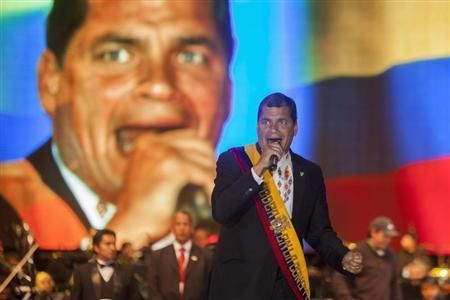
"The world has failed us," said Ecuadorian President Rafael Correa last week. In a decision he called one of the most difficult he has had to take as president, Correa announced that his UN-backed plan to save the Yasuni National Park - from oil exploitation by raising some $3.6 billion from international donations had failed, meaning he would ask Ecuadorian Congress to back drilling in that swath of the Amazon. And days later, after getting bludgeoned by press outlets for the move, Correa took to Twitter to deliver a barb at unnamed newspapers. "Now the biggest 'environmentalists' are the mercantilist dailies," he wrote.
"Okay then, if we go to a popular plebiscite [on the question of whether to allow drilling]," Correa added, "let's also propose all-digital newspapers to save paper and avoid such indiscriminate felling of trees. We'll see who is who. Don't let yourselves be fooled." Opponents of the drilling plan have begun to organize their efforts to circulate a petition bearing some 600,000 signatures, which would force the issue to go to a popular referendum. 78 percent of Ecuadorians are said to be against drilling in the park, which aside from being one of the most bio-diverse areas in the world, is also home to several indigenous communities, including the Tagaeri and the Taromenane. Parts of the 3,860-square-mile park have been the site of drilling since the 1970s. But the new area - known as the ishpingo-Tambococha-Tiputini (ITT) oil field - is expected to bring in some $7.2 billion in revenue to Ecuador's government over 13 years.
In response to the announcement of the petition, Correa said on Saturday on his nationally televised program, "Fine, let's go to the plebiscite, you all have the full constitutional right to it, but don't be vague about it. If you say you've got so much support, collect the signatures...we're sure that the Ecuadorian people will believe in our word and we'll win again." He also acknowledged that his plan to raise money from the international community was "a failure", but trumpeted an unexpected success which had arisen from it: "the creation of ecological awareness". "Who in previous governments know what the Yasuni was? Now who doesn't?," he said.
Correa has long engaged the press in wars of words, leveling his stinging sarcasm at those who criticize him and even filing lawsuits against journalists and outlets for libel. Ecuador's 2008 Constitution, approved on his watch, guarantees the "right to reply" to those who say they were slandered by the media. And he has taken full advantage of that: from January 2007 to August 2012, his government's prepared 1,365 rebuttals to broadcast segments.
RELATED: Rafael Correa Warns US He Won't Accept 'Blackmail' On Edward Snowden
© 2025 Latin Times. All rights reserved. Do not reproduce without permission.




